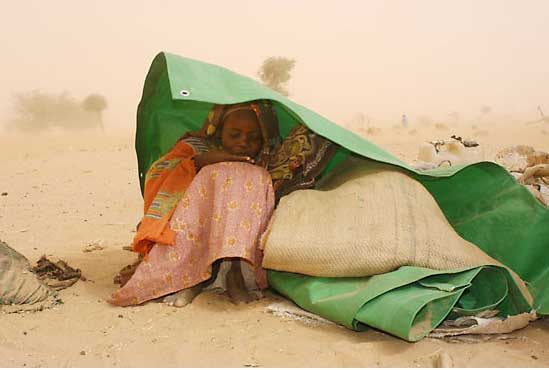2003 Genocide in Dafur

Dafur
A two decade civil war came close to an end when the Southern rebels and the government entered into a ceasefire followed by a series of agreement between both sides. A new rebellion broke out led by African farmers in the West who attacked the central government. The government responded by brutal attacks on the civilian populations in the region of Darfur. Hundreds of villages were burned and thousands died.
The Second Sudanese Civil War started in 1983 and lasted until 2005, primarily involving the Sudan People's Liberation Army (SPLA) and various other armed groups in the south against the Sudanese government in the north. The war had several root causes, including economic, cultural, and religious differences between the north and the south, as well as disputes over natural resources like oil. The conflict was marked by widespread atrocities, including massacres, enslavement, and famine, which resulted in approximately 2 million deaths and over 4 million people being displaced.
The conflict came to an end with the signing of the Comprehensive Peace Agreement (CPA) in 2005. The CPA provided for a power-sharing agreement and laid the groundwork for the 2011 referendum in which South Sudan voted for independence. However, the CPA did not address issues in other regions, including Darfur.
The conflict in Darfur, a region in western Sudan, began around 2003. This conflict differed from the Second Sudanese Civil War in its actors and immediate causes but had some similarities in terms of the involvement of the Sudanese government and issues like ethnic tension and resource scarcity.
The Darfur conflict primarily pitted non-Arab ethnic groups against Arab militias known as the Janjaweed, which were reportedly supported by the Sudanese government. The conflict began when two rebel movements—the Sudan Liberation Army (SLA) and the Justice and Equality Movement (JEM)—rose against the Sudanese government, citing economic marginalization and ethnic discrimination.
The government's response was brutal and disproportionate, targeting not only the rebels but also the civilian population perceived to be supporting them. This led to widespread atrocities, including mass killings, rapes, and the burning of villages, resulting in hundreds of thousands of deaths and the displacement of millions. The international community widely criticized Sudan for these actions, and various organizations and governments described the events as genocide.
 >
>